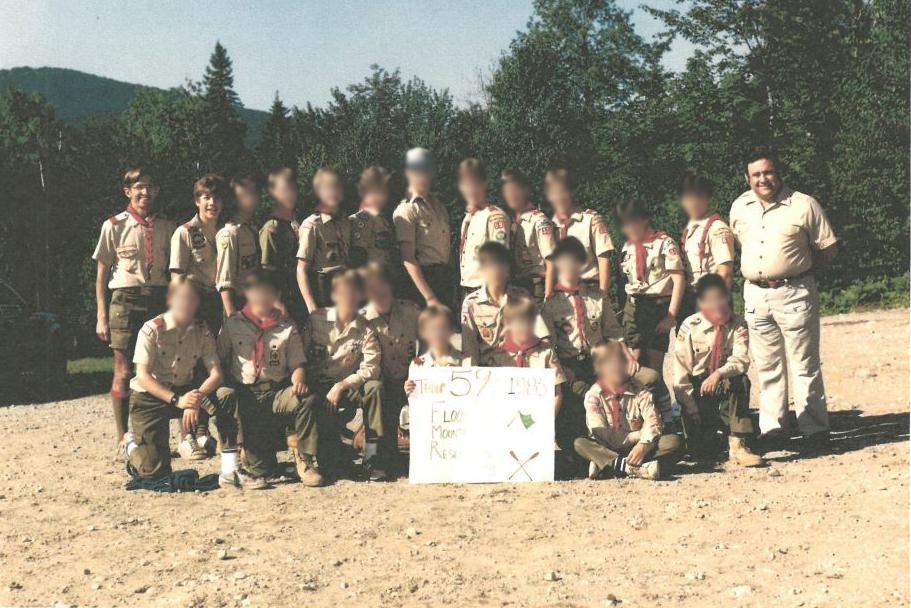
Tim was just looking for an escape.
He was 13 or 14 years old, living in 1980s New Jersey, and needed something to keep his mind off his parents' divorce.
He found that release in the Boy Scouts after a friend convinced him to join.
“It was something different, and being in a small town, all your friends were there and it was like the place to be,” Tim said.
CPR is only using Tim's first name for privacy reasons.
But that escape soon became a nightmare. It wasn’t long after he joined the scouts when a scoutmaster named John Cebak began sharing a tent at night with Tim, and abused him.
“At night I would wake up and I would feel something, a hand down my pants, and I would roll over and pretend to be asleep," Tim said.
"I don't think acknowledgment was ever there between the two of us.”
The abuse would shape the rest of his life.
On December 1 of this year, Tim, who now lives in Denver, plans to join other former scouts who were abused across the country in filing lawsuits against Boy Scouts of America. A law passed earlier this year in New Jersey is making that possible.
The law extends the statute of limitations for sexual abuse in general in the state — allowing people like Tim, who grew up there, to sue after all these years. But the law could also help scouts abused in any state to seek justice.
Attorneys like Vincent Nappo, who’s representing Tim, will argue that because BSA was headquartered in New Jersey for roughly 30 years, scouts who were abused in that time can sue, regardless of where the abuse occurred.
“I would say in the last six months alone, we've spoken to close to 500 men with stories like Tim's,” Nappo said. “The men and women that we represent, the abuse survivors, all of them want accountability. They want to speak out so that people know about this danger, know about this problem, and they want to make sure that something like this can't happen in communities again.”
It’s for those same reasons Tim decided to share his story and plans to sue.
The abuse continued after that night in the tent. The scoutmaster even started taking Tim and other boys on private camping trips to the Jersey Shore and a trip to Disneyland.
Tim never told anyone about Cebak’s actions until he was in college. After telling his dad, they decided to go to the police. But the current New Jersey statute of limitations had already expired, and the scoutmaster wasn’t prosecuted.
“I was told that they brought him in for questioning. He admitted it. He also said I was one of the harder ones to explain it about,” Tim said. “But they said there was nothing they could do.”
Harder to explain because, Tim said, Cebak had become close friends with his family during that time.
“That's what these people do. They prey on people. They pray on people's families,” he said.
As a father himself now, Tim said the abuse he experienced as a child greatly influences how he parents.
“It makes me keep a very close eye on my kids,” he said. “I know everybody they talk to, everything they do. They're never left alone. To tell you the truth, I don't think they’ve maybe once had a babysitter that’s not been a family member.”
Cebak died in 2016. As far as Tim and Nappo can tell, he was involved in BSA up until his death, even though there were several reports of sexual abuse against him.
In response to a CPR request for comment, the BSA said in a statement:
“We sincerely apologize to anyone who was harmed during their time in Scouting. The safety and protection of children is our most important priority. The BSA has taken significant steps over many years to ensure that we respond aggressively to reports of abuse. Today, the BSA has multi-layered safeguarding policies, including mandatory training for all volunteers, background checks, mandatory reporting to law enforcement and a 24/7 Scouts First Helpline to access counseling and help needed to report any inappropriate behavior.”
But Nappo does not think the organization has taken enough steps to keep scouts safe and has not been held accountable for decades of abuse that went unchecked.
“They knew going back to the 1930s that thousands of pedophiles, child molesters, predators were using their program to access kids, which led them to create a database tracking these predators,” Nappo said. “And rather than educate the public and educate their membership about this danger, they kept it secret. And what do we know about child molesters and child predators? They thrive in secrecy.”
This database tracked potential or known predators in an effort to keep them out of the boy scouts. But Nappo points out, it would have been very easy for these people to change their names or move to a different state — taking advantage of the communication breakdown between local councils and the national headquarters.
Nappo said there’s a chance that if BSA had been more public and open about this database years ago, thousands of abuse cases could have been avoided.
“Like educate their members, talk to the public about this problem, implement policies within their program where you have more than one adult on every scouting event, where you don't allow a scout leader to sleep in the tent with a young scout,” he said.
“So many parents I've spoken to, even from back in the ‘60s and the ‘70s, talk about this danger that we all now know about in terms of child abuse and child molestation," Nappo continued. "And they frankly admit that they didn't even think that was something that was a concern for boys. They thought it was only girls who were assaulted.”
Tim hopes his coming forward will prompt other survivors to come forward as well, eventually ending the cycle of secrecy that perpetuates abuse.
“I've confirmed now that there were others before me," he said. "If they actually had come forward, I may have not been affected by this."









